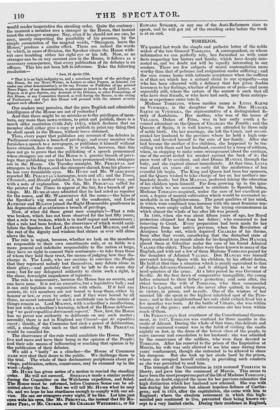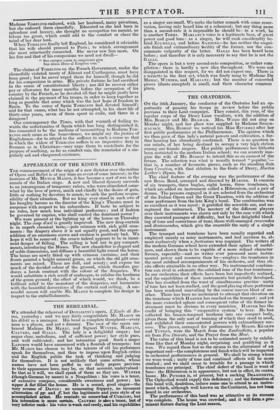TORRIJOS.
WE quoted last week the simple and pathetic letter of the noble widow of the late General TORRIJOS. A correspondent, on whose information we can perfectly rely, has furnished us with some facts respecting her history and family, which have deeply inte- rested us, and we doubt not will be equally interesting to our readers. There are few subjects of moral contemplation more worthy than that of patience and resignation under suffering ; and the case comes home with intimate acceptance when the sufferer is of that sex which has a natural claim to our sympathy—one. who has been educated with a delicacy that has given double keenness to her feelings, whether of pleasure or of pain—and more especially still, where the nature of the sorrow is such that all who have dear friends, or who have had such, may from anticipa- tion or experience enter into it.
Madame TORRIJOS, whose maiden name is LUISA SAENZ DE VINIEGRA, IS the daughter of the late Don MANUEL SAENZ DE VINIEGRA, the representative of a distinguished fa- mily of Andalusia. Her mother, who was of the house of VELASCO, Dukes of Fries, was in her early youth a fa- voured attendant on the Queen of CHARLES the Fourth ; and the Queens of Spain, it is well known, are attended by those only of noble birth. On her marriage, she left the Court, and accom- panied her husband to the province where he held a high com- mand, and devoted herself to the care of her family. After she had become the mother of five children, she happened to be travelling with them and her husband, escorted by a troop of soldiers, when, on stopping to make some arrangement about the carriage, one of the escort rested his musket against the back of it; the piece went off by accident, and shot Donna MANUEL through the body, and she expired almost immediately. At that time, LUISA. was about six years old : so early did the misfortunes of her eventful life begin. The King and Queen had been her sponsors, and the Queen wished to take charge of her on her mother's me- lancholy death; but Don MANUEL preferred taking the education of his children upon himself. Far from growing up in the igno- rance which we are accustomed to attribute to Spanish ladies, Madame TORRIJOS acquired, under the care of her excellent pa- rent, a degree of mental cultivation which would be accounted re- markable in an Englishwoman. The great qualities of her mind, in which were cembined true heroism with the most feminine ten- derness, were amply called forth by the trying circumstances in which almost the whole of her after life was passed. In 1808, when she was about fifteen years of age, her Royal protectors claimed her from her father; who consented to her removing to Court. Every preparation had been made for her departure from her native province, when the Revolution of Aranjuez broke out, which deprived CHARLES of his throne. Soon after that event, considering that the disturbed state of Spain rendered it an unsafe abode for his daughters, Don MANUEL placed them at Gibraltar under the care of his friend Admiral VALDEZ (the elder). These ladies were there known to many of the English, and with not a few of them Madame TORRIJOS passed for the daughter of Admiral VALDEZ. Don Maxim. was himself prevented leaving Spain with his children, by his official duties. He held at that time a situation which is nearly equivalent to that of Judge-Advocate-General; and it obliged him to be at the head-quarters of the army. At a later period he was Governor of Seville. At the first dawn of comparative tranquillity, the young ladies returned to their father's protection; and soon after, the eldest became the wife of TORRIJOS, who then commanded DOYLE'S Legion, and whom she never after quitted, in danger, in victory, in prison, and in exile. One of the winters of her married life she spent in the highest inhabited spot of the Pyre- nees; and in that neighbourhood her only child (which lived but a few months) was born. At the battle of Vittoria, she was within hearing of the guns; and on other occasions she has been within reach of them.
On FERDINAND'S first overthrow of the Constitutional Govern- ment, in 1817, TORRIJOS was confined for three months in the castle of Alicant. During the whole of that time, this delicate and tenderly nurtured woman was in the habit of visiting the castle nightly on foot, in the dress of the lowest class of the people, to carry succour and consolation to her husband: she was admitted by the connivance of the soldiers, who were then devoted to TORRIJOS. After his removal to the prison of the Inquisition at Murcia, his wife was only allowed to see him once during three years' confinement, though she entreated to be allowed to share his dungeon. But she took up her abode hard by the prison, where she occupied herself entirely in providing such comforts as she was permitted to send him. The triumph of the Constitution in 1820 restored TORRIJOS to liberty, and gave him the command of Murcia. This seems to have been the most prosperous part of the life of Madame TORRIJOS; and she, no doubt, enjoyed the more for her previous calamities the high distinction which her husband now attained. She was with him during his glorious but almost hopeless defence of Cartha- gene; and in 1824, after the capitulation, she came with him to. England; where the absolute retirement in which this high- minded pair continued to live, prevented their being known ex- cept to a very limited circle. During their residence in England, Madame Totutiaos.endured, with her husband, many privations, but she endured them cheerfully. Educated as she had been in splendour and luxury, she thought no occupation too menial, no labour too great, which could add to the comfort or cheer the mind of her dear lord. When Toaau os finally left England, he considered it advisable that his wife should proceed to Paris ; to which arrangement she most reluctantly consented. She never saw him more. On his fate and that of his companions we need not dwell—
Sus cuerpos yacen in sangrienta pira Sus ahnas likes al Empire° van."
The claims of ToaniJos on the French Government, under the shamefully violated treaty of Alicant and Carthagena, must have been great; but he never urged them for himself, though he did for his companions in arms. His private fortune he had sacrificed in the cause of constitutional liberty ; nor did he recover either pay or allowance for many months before the occupation of his country by the French, as he devoted all that he might justly have claimed to the payment of his troops, in order to keep together as long as possible that army which was the last hope of freedom in Spain. To the cause of Spain TORRIJOS had devoted himself; and for that cause, what has he not attempted, in his short life of thirty-nine years, seven of them spent in exile, and three in a dungeon ! Our contemporary the Times, with that warmth of feeling to- wards the unfortunates of Spain which has long distinguished it, has consented to be the medium of transmitting to Madame TOR- RIJos such sums as the benevolence, we might say the justice of Englishmen—for to attend to the sufferer in such a cause as that in which the widow of TORRIJOS suffers is an imperative duty in freemen as in Christians—may urge them to contribute for the purpose of soothing, as far as comfort can, the remainder of a sin- gularly sad and chequered existence.



























 Previous page
Previous page